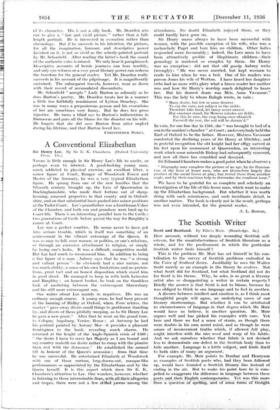A Conventional Elizabethan
Timm is little enough in Sir Henry Lee's life to excite, or perhaps even to interest. A good-looking young man, much addicted to physical exercise, an excellent tilter, minor figure at Court, Ranger of Woodstock Forest and Master of the Armoury, he was a very typical Elizabethan figure. He sprang from one of the new families that the fifteenth century brought up, the Lees of Quarrendon in Buckinghamshire, who made their fortune out of sheep. farming, amassed properties in that county and in Oxford- shire, and on that substantial basis pushed into minor positions at the Tudor Court. Lee's grandfather was a Gentleman Usher of the Chamber, and both son and grandson were bred up to Court-life. There is an interesting parallel here to the Cecils : two generations of Ceeils before paved the way for Burghley's career at Court.
Lee was a perfect courtier. He seems never to have got into serious trouble, which in itself was something of an achievement in the vibrant entourage of the Queen. It was so easy to fall, over women, or politics, or one's relations, or through an excessive attachment to religion, or simply by losing one's looks. It was a difficult, competitive world. But Lee had much to recommend him. In addition to being a fine figure of a man—Aubrey says that he was "a strong and valiant person "—he obviously had a nice nature, not too much ability, a sense of his own limitations and no preten- lions, great tact and an honest disposition which stood him in good stead. He managed to keep in with both Leicester and Burghley ; an honest broker, he took on the thankless task of mediating between the extravagant Shrewsbury and his still more extravagant son.
One writes about Lee mainly. in negatives. His was an ordinary enough course.- Ayci ung man, he had been present at the burning of Ridley at Oxford, when, Foxe relates, the martyr "gave away 'divers small things to gentlemen standing by, and divers of them pitifully -weeping, as to Sir Henry Lee he gave a new groat." After that he went on the grand tour, to Cologne, Augsburg, Venice, Rome ; at Antwerp he had his portrait painted by Antony Mor—it provides a pleasant frontispiece to the book, revealing. _much charm. He returned at the height of the Anglo-Spanish crisis of 1569; " the desire I have to serve her Majesty as I ,am bound and my :country maketh me desire rather to creep with the pismire than, rest with, the dormouse? He established the annual tilt in. honour of the Queen's accession -from- that time he was successful. He entertained Elizabeth at Woodstock with one of those curious, long-drawn-out, masque-like performances so appreciated by the Elizabethans and by the Queen herself. It is this ,aspect which drew Sir E. K. Chambers's attention to Lee. One wonders, however, whether inlistening- to those interminable linesovithlill theirallegpries and tropes, there were not a few-stifled yawns "among 'the
attendance. No doubt Elizabeth enjoyed them, or they could- hardly have gone on.
Sir Henry seems always to have been succesiful with women, with the possible exception of his wife, who was a melancholy Paget and bore him no children. Other ladies responded more favourably ; indeed, the Lees seem to have been attractively prolific of illegitimate children—their genealogy is rendered so complex by them. Sir Henry was no exception : did not that old gossip Aubrey write (wrongly) : He was never married, but kept woemen to reade to him when he was a bed. One of his readers was parson Jones his wife of Wotton. I have heard her daughter (who had no more witt) glory what a brave reader her mother was and how Sir Harry's worship much delighted to heare her. But his dearest deare was Mris. Anne Vavasour." This was the lady to whom Ralegh wrote, in vain : "Many desire, but few or none deserve To cut the corn, not subject to the sickle. Therefore take heed, let fancy neVer swerve But constant stand, for Mowers mindes are fickle.
For this be sure, the crop being once obtain'd Farewell the rest, the soil will be distain'd."
In vain, for one fine day in 1581, she" was brought to bed of a son in the maiden's chamber" at Court ; and everybody held the Earl of Oxford to be the father. However, Mistress Vavasour comforted the declining years of Sir Henry at Ditchley, and in gratcfnl recognition the old knight had her effigy carved at his feet upon his monument at Quarrendon, an interesting work which some miserable Bishop had subsequently removed, and now all there has crumbled and decayed. .
Sir Edmund Chambers makes a good point when he observes ;
"Biography may complete the picture of an age, by its illumina- tion of the lives of lesser men, who are tihemselves largely the product of the social forces at play, but reveal these from another angle, and by their reactions help to determine the resultant issue."
We have to be grateful for so comOlete: and scholarly an investigation of the life of this lesser man, which went to make
up the Elizabethan background. But whether it was worth doing with such minuteness, and such inordinate detail, is
another matter. The book is clearly not in the result, perhaps was not even intended, for the general reader.
A. L. ROWSE.
















































 Previous page
Previous page